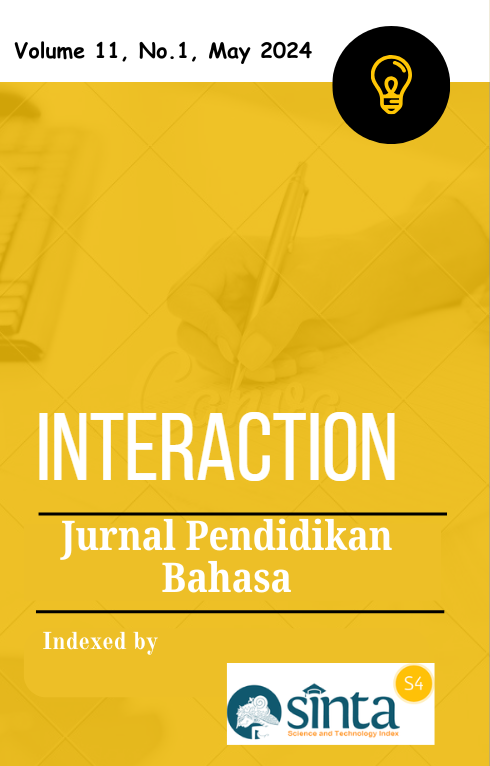Anxiety of Warriner in Charles Williams’ Dead Calm
Abstract
Dead Calm is a novel of anxiety undergone by the main character, Warriner, after lacking emotional desires. The mere cause of the emotional desire lack is the hostile incident as well as pain. Therefore, the researcher gets interested in conducting analysis because emotional desires make human life stable. How the main character experiences the anxiety becomes the focus of the researcher’s study. Anxiety’s types as well as descriptive qualitative method are worth using because the researcher is able to observe deeply about anxiety’s symptoms undergone by the main character that is neurotic, moral, and realistic anxiety. Then, the study shows that the main character undergoes those mentioned types of anxiety through his feeling of weakness, worriedness, and punishment fear, remorseful to the other character and facing a real danger. Eventually, the kinds of anxiety deserve a deep studying since people can keep the anxiety out of their life through the knowledge.
Downloads
References
Annisa, D, et al. (2016). Konsep Kecemasan pada Lanjut Usia. Jurnal Konselor Unversitas Padang, 5 (2), 93-99. https://ejournal.unp.ac.id/index.php/konselor/article/view/6480/5041
Asyfa, U.N, Suharyati, H. & Widisanti, N.M. (2019). The Main Characters Anxiety Disorder in the Novel Blue Skies by Catherine Anderson. Journal Albion: Journal of English Literature, Language and Culture, 1 (1), 01-06. URL: https://journal.unpak.ac.id/index.php/albion/article/view/1117
Cahyaningrum, I.O. (2019). An Analysis of Intrinsic Elements and the Portrayal of Anxiety in Linkin Park’s Song Lyrics. JELLE: Journal of English Literature, Linguistics and Education, 2 (2), 12-17. URL: https://jurnal.unikal.ac.id/index.php/jelle/article/view/1529
Cherry, K. (2020). 20 Common Defense Mechanisms Used for Anxiety. Verywell Mind. Retrieved from https://www.verywellmind.com/defense-mechanisms-2795960
Fanani, A. (2015). A Psychological Thriller in Donna Tartt’s the Goldfinch. Prosodi: Jurnal Ilmu Bahasa dan Sastra, 9 (1), 1-9, URL: https://journal.trunojoyo.ac.id/prosodi/article/view/456
Feist, J., Gregory J Feist, D., & Roberts, T. (2017). Theories of personality. McGraw-Hill Education.
Glas, G. (2020). An Enactive Approach to Anxiety and Anxiety Disorders. Philosophy, Psychiatry, & Psychology 27(1), 35-50. doi:10.1353/ppp.2020.0005
Kuchta, K., Hladikova, M., Thomsen, M., Nahrstedt, A., & Schmidt, M. (2021). Kava (Piper methysticum) extract for the treatment of nervous anxiety, tension and restlessness. Drug Research, 71(02), 83-93.
Jonas, E., McGregor, I., Klackl, J., Agroskin, D., Fritsche, I., Holbrook, C., Nash, K., Proulx, T., & Quirin, M. (2014). Threat and defense: From anxiety to approach. In J. M. Olson & M. P. Zanna (Eds.), Advances in experimental social psychology, Vol. 49, (pp. 219–286). Elsevier Academic Press.
Kurniasari, A. R. (2022). Anxiety of Warriner in Charles Williams’s Dead Calm. English Department, UIN Sunan Ampel Surabaya. p, 25.
Ma, H., & Miller, C. (2021). Trapped in a double bind: Chinese overseas student anxiety during the COVID-19 pandemic. Health communication, 36(13), 1598-1605.
Monica, T.A., Jepri, & Janah, U (2020). Self Defense Mechanism as an Overcoming Tool of Anxiety in the Novel Me Before You. Prologue: Journal on Language and Literature, 6 (1), 1-13, URL: https://prologue.sastra.uniba-bpn.ac.id/index.php/jurnal_prologue/article/view/51
Nassaji, H. (2015). Qualitative and descriptive research: Data type versus data analysis. Language Teaching Research, 19(2), 129-132. https://doi.org/10.1177/1362168815572747.
Nurteteng, N. (2022). Cue Card Media in Reducing The Students Speaking Anxiety. INTERACTION: Jurnal Pendidikan Bahasa, 9(1), 214-223. https://doi.org/10.36232/jurnalpendidikanbahasa.v9i1.2751.
Ong, C. W., & Twohig, M. P. (2022). The Anxious Perfectionist: How to Manage Perfectionism-Driven Anxiety Using Acceptance and Commitment Therapy. New Harbinger Publications.
Rutberg, S., & Bouikidis, C. D. (2018). Focusing on the fundamentals: A simplistic differentiation between qualitative and quantitative research. Nephrology Nursing Journal, 45(2), 209-213.
Schultz, Duane P., et al, (2017), Theories of Personality. CENCAGE Learning
Williams, Charles. 1963. Dead Calm. United States: Viking Press




.png)



22.png)
